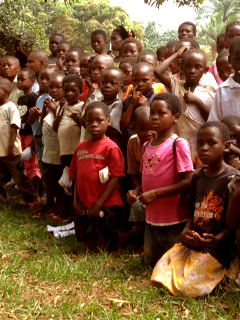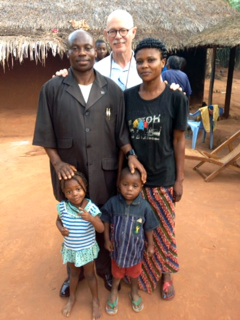When I flew out of Sea-Tac Airport on the afternoon of January 16th, I had a hunch I was in for a journey of a lifetime. My experiences over the next ten days confirmed my intuitions. It would be difficult to describe, in 300 words or less, the profound impact that this journey has had on my understanding of poverty and my appreciation for the incredible challenges and the amazing opportunities that we (World Vision, The Evangelical Covenant Church (ECC), and our African church partners) face to bring the blessings of transformational development and “life in it’s fullness” to the children of this forgotten corner of the world. What I would like to try to do is share several random thoughts about my journey to Gemena, which I hope will provide those who read this blog with some sense of what mattered most to this pilgrim.
#1. DRC: The Poorest, Rich Country in the World
 The DRC has been described this way by many observers, and I found this generalization to be remarkably accurate. There is no question that the poverty I saw and experienced in Gemena is unlike anything I have experienced on my previous visits to sub-Saharan Africa. If you can imagine a city with a population of 300,000 souls without a single paved road, a bank, or a restaurant…then you have imagined Gemena! The extreme poverty in the DRC is even more difficult to understand given the richness and variety of the natural resources that the country possesses. One-sixth of the world hydro-electric potential is in the DRC. It is also rich in cobalt, copper, gold, and diamonds. And ten percent of the world’s tropical rain forests are in the DRC. One of the greatest challenges facing the citizens of Gemena (and one of the obstacles to community development) is the isolation of the region. It must be one of the most difficult places in the world to work. And yet, this is also a place with incredible resources, especially the human variety! The ECC has been in this region for 75 years and work in partnership with committed ECC missionaries like Peter and Cindy Ekstrand and Tim and Helen Smith, who we were pleased to meet and break bread with on several occasions during our visit.
The DRC has been described this way by many observers, and I found this generalization to be remarkably accurate. There is no question that the poverty I saw and experienced in Gemena is unlike anything I have experienced on my previous visits to sub-Saharan Africa. If you can imagine a city with a population of 300,000 souls without a single paved road, a bank, or a restaurant…then you have imagined Gemena! The extreme poverty in the DRC is even more difficult to understand given the richness and variety of the natural resources that the country possesses. One-sixth of the world hydro-electric potential is in the DRC. It is also rich in cobalt, copper, gold, and diamonds. And ten percent of the world’s tropical rain forests are in the DRC. One of the greatest challenges facing the citizens of Gemena (and one of the obstacles to community development) is the isolation of the region. It must be one of the most difficult places in the world to work. And yet, this is also a place with incredible resources, especially the human variety! The ECC has been in this region for 75 years and work in partnership with committed ECC missionaries like Peter and Cindy Ekstrand and Tim and Helen Smith, who we were pleased to meet and break bread with on several occasions during our visit.
#2. Ledia: Something New is Coming!!
The name of our new area development project in Gemena is Ledia, which means “something new is coming”” in the Lengali dialect. Perhaps the single most exciting and hopeful indicator of the ultimate success of this new Kingdom ministry is the way in which our three church partners (Covenant Church of Congo (CEUM), The Evangelical Free Church of Congo (CECU), and the local Roman Catholic churches) are working together to accomplish our ambitious goals. My visit convinced me that perhaps the greatest asset that we have is the extraordinary way the three church partners work together to advance our development goals in the region. This level of respect and cooperation/collaboration between Protestants and Roman Catholics is, in my experience, unusual and truly remarkable.
#3. The People of Congo
 Perhaps the highlight of the trip for me was the opportunity to spend an afternoon and evening with a Congolese host family. I stayed in the home of Zallure and Shirley Pascal and their 8 children (three of the children are registered in the World Vision project in Gemena) as well as Zallure’s mother. Zallure is the manager of the CEUM guesthouse where we stayed throughout our visit. Shirley earns a modest income from planting/harvesting and grinding manioc for sale. One of the greatest challenges for this family is simply providing adequate food. Zallure told me the family eats one meal a day and that it is very rare that they are able to serve meat or chicken. In spite of the formidable obstacles, this family was filled with joy and demonstrated astonishing hospitality. This was my fifth trip to Africa but the first time I have ever had the privilege of spending significant chunk of time visiting a family in their home. The experience provided a kind of insight, empathy, and a feeling of having been uniquely and richly blessed by my Congolese hosts that will remain with me for the rest of my life.
Perhaps the highlight of the trip for me was the opportunity to spend an afternoon and evening with a Congolese host family. I stayed in the home of Zallure and Shirley Pascal and their 8 children (three of the children are registered in the World Vision project in Gemena) as well as Zallure’s mother. Zallure is the manager of the CEUM guesthouse where we stayed throughout our visit. Shirley earns a modest income from planting/harvesting and grinding manioc for sale. One of the greatest challenges for this family is simply providing adequate food. Zallure told me the family eats one meal a day and that it is very rare that they are able to serve meat or chicken. In spite of the formidable obstacles, this family was filled with joy and demonstrated astonishing hospitality. This was my fifth trip to Africa but the first time I have ever had the privilege of spending significant chunk of time visiting a family in their home. The experience provided a kind of insight, empathy, and a feeling of having been uniquely and richly blessed by my Congolese hosts that will remain with me for the rest of my life.
My brief visit to the Equateur Province of the Democratic Republic of the Congo in January provided me with a wonderful window through which to view the challenges and the enormous opportunities that we have to bring the rich blessings of
transformational development to the children of this region of the world which seems trapped in the vice grip of extreme poverty. What we are attempting to do in Gemena, DRC is audacious and unprecedented, but I believe it is God’s work and if we are faithful then God will use all of us in this wonderful partnership to be His hands, feet, and arms reaching out to touch and bless the lives of his precious children in the Equateur Province of the DRC.




Thanks for your article.
I lived near Gemena, Ubangi province, Republic of the Congo-Kinshasa in 1962-63 as an 18 year old. I was looking into the Mbaka tribe and langues that I remember was what the locals were called when I was there and find that the names of the towns and provinces have oftentimes changed.
I was pleased to see your article, a recent entry, refer to Gemena. Is there still an agriculture school on a hill above the town?
I’m interested in finding out what a phrase I was taught in Mbaka (sp?) means. Do you have contact with someone in the area who might help? Does the name Bob Thornbloom mean anything to anyone there? (At the time he was the only non-native in the area who spoke Mbaka fluently. He was stationed at a missionary post that had a school there.
What does “Izini kini go?” mean in Mbaka. I was told by the natives it meant, ” I don’t understand, could you repeat?” But their laughter when I said this each morning in response to their inquiries, made me suspect I was the victim of a joke. It was a light hearted way to start each day and I didn’t mind, but have always been curious, since they wouldn’t tell me differently.
Thanks, Lloyd Kumley
Report This Comment
04.16.13 at 1:27 pm
Hi, Lloyd:
I worked as a teacher in that Gemena Agriculture School on the abandoned Belgium plantation in 1964. After fifty years, I am wondering what happened to it also. It does not appear to still be there.
Robert Thomas
Report This Comment
11.14.14 at 6:46 am
Thanks for your comments. If you are referring to the agricultural school at IPOK in Gemena, that is no longer functioning. Lloyd, I asked a native Ngbaka speaker about the phrase you mentioned and he said it is spelled like this “iziti kinigo” and it means “I did know, but not this one, or, I did not know it.” Looks like our Congolese friends were having a bit of fun with you 🙂
Report This Comment
11.21.14 at 4:42 pm